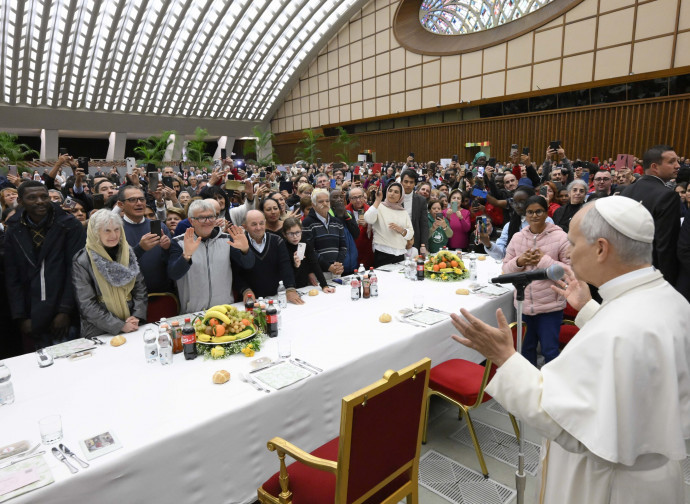Trans at Vatican lunch was not Pope Leo’s decision
The Washington Post reports that at the lunch for the poor, no transgender person sat next to the Pope. Seats were assigned at random, replies Cardinal Krajewski. It is not the Holy See that chooses participants by 'category', but perhaps those demanding gestures from Prevost typical of Bergoglio.

Although it wasn't on the menu, the lunch at the Vatican for the Jubilee of the Poor ended on a sour note. The Washington Post, among other publications, covered the initiative the following day, highlighting the absence of transgender people from the table where the Pope ate in the Paul VI Hall. In fact, a few dozen trans people attended the lunch (the final number fluctuates: some say 48, while others say more than 30), as happened in previous years for the World Day of the Poor.
The US newspaper reported an alleged anonymous confidence from two people involved in organising the event, who said that 'no seats were allocated to transgender women at the tables of honour this year, without any explanation'. The Washington Postpointed out polemically that, in 2023 and 2024, two transgender people had sat at the table with Francis. This was an obvious attempt to create an unsavoury comparison between the last two popes, which, according to the authors, would work to the disadvantage of Pope Leo.
To find out more about what really happened, the Daily Compass spoke to Cardinal Konrad Krajewski. The head of the Apostolic Elemosineria, who organised the luncheon, did not hide his displeasure at this unexpected controversy in the face of an event of which he seems particularly proud. Krajewski explained that the nineteen people at the table with the Holy Father were chosen at random by him at the last moment, after the Angelus.
Therefore, there was no deliberate exclusion, as the two sources who spoke to the Washington Post would have us believe. The cardinal seemed genuinely upset and told us, "When good things happen, the devil always gets involved." Recognising his zeal for charitable service, when we intercepted him he was on his way back from distributing food in Tor Bella Monaca.
However, the controversy surrounding the table of honour raises inevitable questions about the appropriateness of inviting so-called 'transgender activists' to the event. Were they invited as such to the lunch in Paul VI Hall? If so, what does inviting such a 'category' have to do with helping the poor? We sought clarity on this point from the cardinal in charge of the organisation that held the event.
In the week leading up to the lunch, Alessia Nobile — a transgender individual who had played a leading role in the widely discussed LGBTQ+ Jubilee, and who was known for her activism in favour of rainbow rights (earning her the friendship of Francis) — was given extensive media coverage. Some have also written that the invitation to the lunch for transgender people came after Nobile submitted a formal request for an audience with the Pope. This is not the case. Krajewski was clear with the Daily Compass: 'We gave 1,300 tickets to associations, dormitories, canteens, foundations, Caritas and parishes in difficult neighbourhoods. It was their managers who distributed them to whoever they deemed appropriate, not us'.
Therefore, there was no invitation from the Apostolic Elemosineria (and therefore the Holy See) to 'transgender activists', as has repeatedly been written in recent days. However, in the Vatican, they cannot claim ignorance, given the numerous articles last week about the presence of self-proclaimed activists.
It is presumed that most of the transgender people present in Paul VI Hall were invited by Fr Andrea Conocchia, the Torvajanica parish priest, who had previously acted as an intermediary between Pope Francis and a group of transgender people in financial difficulty following the outbreak of the pandemic. This resulted in an acquaintance that has continued over the years and has been widely written about. Perhaps the two inside sources who spoke to the Washington Post would like to force Leo XIV to cultivate the same friendships as his predecessor, even imposing on him a lunch with more than a thousand poor people?
There is a popular (not exactly Christian) saying that one always loses out by doing good; it would be better if, next time, someone's excessive desire for the limelight did not end up making blameless Pope Leo pay the consequences.
